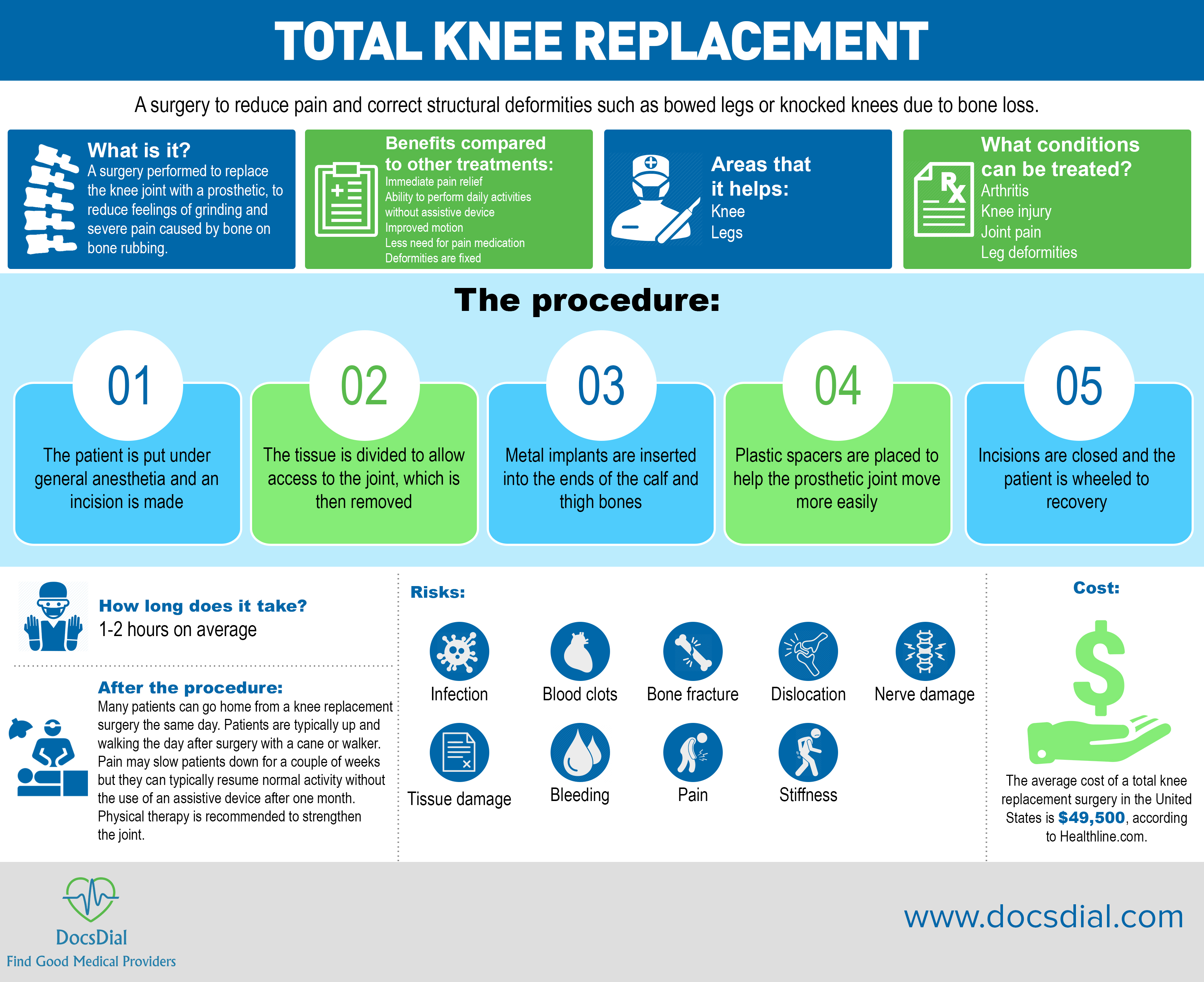Knee replacement
 San Francisco knee and hip pain sufferers – Eliminate pain with a Total Knee Replacement.
90% of San Francisco knee pain patients report significantly reduced pain after surgery.
85% of artificial knees last 20+ years.
San Francisco knee and hip pain patients undergo a TKR if they have arthritis in the hip that has not resolved with conservative treatment.
Candidates for San Francisco total knee replacement surgeries aren’t just looking to relieve a little pain. While pain relief is a main reason for the surgery, those who need a full replacement often have structural deformities such as bowed legs or knocked knees due to bone loss, and the deformity is often very noticeable. When this happens, it’s harder to move the knees without pain and there can be significant loss of motion. Grinding and severe pain are among chief complaints of those who need total knee replacement surgery.
San Francisco knee and hip pain sufferers – Eliminate pain with a Total Knee Replacement.
90% of San Francisco knee pain patients report significantly reduced pain after surgery.
85% of artificial knees last 20+ years.
San Francisco knee and hip pain patients undergo a TKR if they have arthritis in the hip that has not resolved with conservative treatment.
Candidates for San Francisco total knee replacement surgeries aren’t just looking to relieve a little pain. While pain relief is a main reason for the surgery, those who need a full replacement often have structural deformities such as bowed legs or knocked knees due to bone loss, and the deformity is often very noticeable. When this happens, it’s harder to move the knees without pain and there can be significant loss of motion. Grinding and severe pain are among chief complaints of those who need total knee replacement surgery.

What is it?
 San Francisco knee replacement surgery typically takes one to two hours to complete. During this time, damaged bone and cartilage are taken out of the knee and metal implants are inserted into the ends of the calf and thigh bones. Plastic spacers are used to help the prosthetic joint move more easily.
New technologies have changed the way many doctors do knee surgery and given surgeons more options on how to complete the procedure. Computer-aided surgeries, for example, are becoming more common in knee surgeries. The technology has been praised for allowing better placement of the new joint, which helps the new joint last longer. It can also be more beneficial in surgeries where deformities are extreme. When a knee joint is inserted correctly it is less likely to loosen early or wear down quickly.
Not every doctor says the computer-aided technology is an improvement, as knee replacements were already a pretty routine procedure at most hospitals, but the new technology does allow for a new approach that could include some improvements in recovery for the patient.
Many San Francisco total knee replacements can now be done as outpatient procedures, which means a patient goes home the same day as the operation. By prescribing fewer narcotics post-operatively, San Francisco knee pain and hip pain patients are able to get up and move around sooner, which leads to less complications and a faster recovery. Pain may slow patients down for a couple of weeks, but it doesn’t take long for the pain to subside, and then patients feel better than they did before the procedure. With new protocols in place, patients are typically up and walking the day after surgery with a cane or walker, home in one to two days (if the procedure isn’t done outpatient) and resuming normal activity without the use of an assistive device after one month.
San Francisco knee replacement surgery typically takes one to two hours to complete. During this time, damaged bone and cartilage are taken out of the knee and metal implants are inserted into the ends of the calf and thigh bones. Plastic spacers are used to help the prosthetic joint move more easily.
New technologies have changed the way many doctors do knee surgery and given surgeons more options on how to complete the procedure. Computer-aided surgeries, for example, are becoming more common in knee surgeries. The technology has been praised for allowing better placement of the new joint, which helps the new joint last longer. It can also be more beneficial in surgeries where deformities are extreme. When a knee joint is inserted correctly it is less likely to loosen early or wear down quickly.
Not every doctor says the computer-aided technology is an improvement, as knee replacements were already a pretty routine procedure at most hospitals, but the new technology does allow for a new approach that could include some improvements in recovery for the patient.
Many San Francisco total knee replacements can now be done as outpatient procedures, which means a patient goes home the same day as the operation. By prescribing fewer narcotics post-operatively, San Francisco knee pain and hip pain patients are able to get up and move around sooner, which leads to less complications and a faster recovery. Pain may slow patients down for a couple of weeks, but it doesn’t take long for the pain to subside, and then patients feel better than they did before the procedure. With new protocols in place, patients are typically up and walking the day after surgery with a cane or walker, home in one to two days (if the procedure isn’t done outpatient) and resuming normal activity without the use of an assistive device after one month.
Purpose
 Those who undergo total knee replacements in San Francisco notice a significant, immediate change in pain. In many cases, a total knee replacement surgery can also fix a deformity, or at least lessen its affect. Daily activities become easier to complete because of reduced pain, and that grinding/grading feeling many patients complain about can be eliminated. Range of motion may never return to what it was before the knee started experiencing problems, but it should be improved with the possibility of complete recovery in some cases.
Those who undergo a total knee replacement in San Francisco report a reduction in pain, or complete elimination of pain, fixed deformities such as knocked knees or bowed legs, no more grinding or grading feeling caused by the bones within the joint rubbing against each other and the ability to do day to day activities without pain or the use of assistive devices.
Those who undergo total knee replacements in San Francisco notice a significant, immediate change in pain. In many cases, a total knee replacement surgery can also fix a deformity, or at least lessen its affect. Daily activities become easier to complete because of reduced pain, and that grinding/grading feeling many patients complain about can be eliminated. Range of motion may never return to what it was before the knee started experiencing problems, but it should be improved with the possibility of complete recovery in some cases.
Those who undergo a total knee replacement in San Francisco report a reduction in pain, or complete elimination of pain, fixed deformities such as knocked knees or bowed legs, no more grinding or grading feeling caused by the bones within the joint rubbing against each other and the ability to do day to day activities without pain or the use of assistive devices.
Benefits
The benefits of San Francisco total knee replacement surgeries include reduced pain and the ability to complete daily activities pain-free, or relatively pain-free, without the use of assistive devices. Those who undergo a total knee replacement will find it easier to sit, stand and lay down without pain. Deformities such as bowed legs or knocked knees, which affect gait, can be righted.Areas the Surgery Helps:
San Francisco TKR surgery reduces or eliminates knee, hip and leg pain.What conditions can be treated?
San Francisco TKR surgery treats arthritism knee injury, joint pain and leg deformities.The procedure:
San Francisco TKR surgery takes 1-2 hours on average to complete.- The patient is put under general anesthesia and an incision is made
- The tissue is divided to allow access to the joint, which is then removed
- Metal implants are inserted into the ends of the calf and thigh bones
- Plastic spacers are placed to help the prosthetic joint move more easily
- Incisions are closed and the patient is wheeled to recovery
After the procedure:
 Many patients can go home from a knee replacement surgery the same day. Patients are typically up and walking the day after surgery with a cane or walker. Pain may slow patients down for a couple of weeks but they can typically resume normal activity without the use of an assistive device after one month. Physical therapy is recommended to strengthen the joint.
Many patients can go home from a knee replacement surgery the same day. Patients are typically up and walking the day after surgery with a cane or walker. Pain may slow patients down for a couple of weeks but they can typically resume normal activity without the use of an assistive device after one month. Physical therapy is recommended to strengthen the joint.
Alternatives
Before knee surgery, many people try to manage knee pain in San Francisco with medication and/or cortisone shots. Some doctors are suggesting that stem cell injections could repair joints enough that surgery would not be needed. Other interventions can reduce pain in the knee such as physical therapy, losing weight and exercising to strengthen the muscles and increase flexibility. In some cases, a partial knee replacement—which costs 10-20 percent less than a total knee replacement—may suffice and a total knee replacement can be avoided.Risks
There are risks associated with every surgery, and often those risks are made worse by underlying health issues. For example, a patient who is obese is at a higher risk of suffering complications during surgery, and their weight could make their recovery more difficult. A history of heart disease, diabetes or depression can also affect how well a person fairs during surgery and recovery. Mostly these conditions extend the healing process but they do also increase the risk of surgery itself. If you have underlying disease, talk it over with your doctor. If the procedure is too risky, they’ll advise against it, however, that is rare in most cases for knee replacement surgery. Before a total knee replacement surgery, every San Francisco knee pain patient should take steps to make the procedure go more smoothly such as lose weight or quit smoking. Knocking bad habits and improving overall health can also make recovery easier and faster. Risks associated with general anesthesia should also be discussed with your doctor.Payments/cost
The average cost of a total knee replacement surgery in the United States is $49,500, according to Healthline.com. Luckily, insurance will often cover all or part of a total knee replacement, lowering the out-of-pocket cost for patients. Dr. Abbi performs the procedure in San Francisco and surrounding cities.References:
"OA Knee Replacement Pictures: Before and After -- What Happens?" WebMD. Accessed April 23, 2018. https://www.webmd.com/osteoarthritis/ss/slideshow-knee-replacement. HARITINIAN, Emil G., and Ashvin L. PIMPALNERKAR. "Computer Assisted Total Knee Arthroplasty: Does It Make a Difference?" Mædica. June 2013. Accessed April 23, 2018. https://www.ncbi.nlm.nih.gov/pmc/articles/PMC3865127/. "Alternatives to Knee Replacement Surgery." Healthline. Accessed April 23, 2018. https://www.healthline.com/health/total-knee-replacement-surgery/alternatives. "What You Need to Know About the Cost of Knee Replacement Surgery." Healthline. Accessed April 23, 2018. https://www.healthline.com/health/total-knee-replacement-surgery/understanding-costsTotal knee replacement is indicated if you have arthritis in the hip and have failed conservative measures. For more information click here: http://orthoinfo.aaos.org/topic.cfm?topic=A00389
